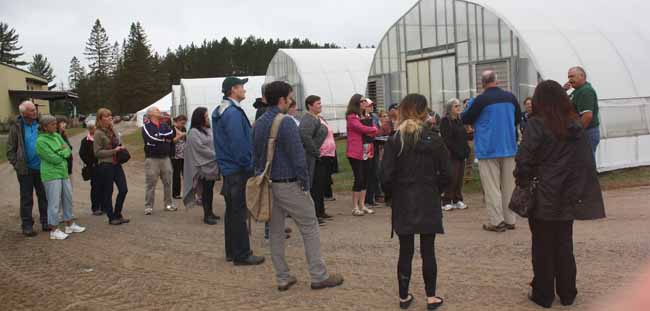Thessalon Bio Centre looking to increase client base

By Leslie Knibbs
THESSALON – Following an opening prayer by Elder Mary Simon of Thessalon First Nation (TFN) at the recent Bio Centre Showcase on September 22 near Thessalon, attendees were given a brief history of the Bio Centre.
In 2000 the community was looking for new initiatives and ways to develop their community in what TFN Councillor Albert Bisaillon called “the most sustainable ways possible”. A decision was made to purchase a large greenhouse operation as a capital investment for future economic development in the community. The deal was sealed in conjunction with a lands claim settlement. Over the years the greenhouse operation formerly used exclusively for tree seedlings is evolving into a multi faceted greenhouse operation with plans to expand into new areas of greenhouse products.
According to Jukka Heikurinen, an operations manager and historian for the site, the original operation goes back to the Second World War when the property was a prisoner of war camp where prisoners “played a major role in tending the forests.” Heikurinen called the area the greenhouse sits in, “quite valuable and the most productive forest in North Ontario.”
At the time of the acquisition, the property was owned by the Ministry of Natural Resources and Forestry (MNR), but had been closed down as a provincial nursery in 1997. The MNR had rented the property to the private sector for the following year; It sat vacant for the years 1998 and 1999 until the TFN purchase in 2000. For the first year a program of growing Alfalfa sprouts was started; however, this grow op did not work out according to Heikurinen. During the early years the facility was used for planting of seedlings with an annual peak production of 1.5 million tree seedlings prior to TFN taking it over in 2000. Although there is currently still a market for the planting of seedlings, it is “not enough to sustain the facility,” said Heikurinen. Since the acquisition the largest production was in 2009 with 800,000 tree seedlings being produced. According to Heikurinen other products are needed at this time.
The facility consists of over 100 acres of land with 20 acres of cleared fields. Although not all greenhouses are in use at present, there are 17 climate controlled greenhouses available for use by prospective clients. In addition to the land and greenhouse operation there is a 6000 square foot refrigeration building including a lab with instrumentation available for clients.
A successful search for new clients or industries would enable expansion of the Bio Centre’s use to the TFN’s benefit. Ideally situated close to the Great Lakes and the US border, both Canadian and US markets can be reached readily. With a deep water port in Thessalon and the Trans Canada highway just minutes away, transportation of the Bio Centre’s product is accessible without delay making ‘on time shipping’ a benefit for future clients.
Darrin Bellerose, the current greenhouse manager said forestry products are “the main bread and butter” for the operation at present; however, TFN are engaging with other partners to increase production at the facility. When asked what businesses would benefit from the Centre’s facilities, Bellerose said many product ideas have “come across the table” including greenhouse vegetable operations which would benefit those living in northern communities. Another and perhaps more recent item that has “come across the table” is the growing of marijuana which the federal government is on the verge of legalizing.
At this time the Bio Centre has formed a partnership with “The Corridors for Life,” a group dedicated to “maintaining utility corridors” by planting grasses, shrubs, wildflowers and ferns along utility corridors. This group have partnered with the Centre to cultivate low lying plants in the greenhouses.
During his presentation, Deputy Chief Glen Hare acknowledged there are challenges facing the Bio Centre, but he recognized that TFN “had the foresight and courage to have invested in a capital investment back in 2000.” Chief Hare credited TFN for “taking the risk and maintaining this asset.” He told those gathered that greenhouse operations are fast becoming essential in the north because of the short growing season and the move towards self-sufficiency is a requirement in food production.
Councillor Basaillon emphasized to those gathered the need to continue developing the First Nation’s key asset, the Bio Centre, by identifying new potential industries, markets and partnerships that would enable further expansion of the Centre. He thanked the Centre’s partners, Nordik Institute, a research institute dedicated to the practice of holistic community development, Forbes Wild Foods, the largest purveyor of hand picked, high quality wild food.
Although Chief Alfred Basaillon was unable to attend the showcase, his message to those present is an optimistic outlook for the community and the future of the Bio Centre, his message read, “Thessalon First Nation Bio Centre has the potential to be developed with the right partnerships. Economic vitality and sustainability for our Bio Centre has always been our goal.”


